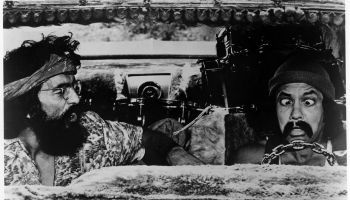Simian summer it is.
Anyone who has seen James Marsh’s thought provoking documentary Project Nim, about a chimp named Nim, will have their viewing experience of Rise of the Planet of the Apes a bit enhanced. And then some.
After Nim, Rise feels like the more commercial and entertaining version of the life of Nim’s relatives, only that in this installment Caesar is the Nim relative who moved to San Francisco.
Rise is fully aware of our collective psychosis regarding contagion, our race to find a cure to incurable diseases and our burning curiosity regarding genetic engineering. No doubt that this awareness gently guided and inspired writers Rick Jaffa and Amanda Silver and director Rupert Wyatt in telling this present day story of science gone mad.
James Franco as a genetic scientist will always be a stretch but when you have speaking apes, I guess suspension of disbelief is the name of the game. Franco is Dr. Will Rodman, whose five years of research at the cool looking facilities (is there any other type?) of the pharmaceutical company Gen-Sys, is about to pay off big time.
A potential cure to Alzheimer’s is in sight but this news may just be too good to be true. When Will is about to close the deal on his research by presenting the latest evidence on a breakthrough with a gene therapy drug called AOZ-112, his world is turned upside down.
[pagebreak]
His subject chimp, Bright Eyes, goes bananas, escapes her cage, creates mayhem before disrupting his board presentation and ends up being gunned down. So much for finding a cure … until we learn that Bright Eyes just had a baby … before going loco. Post partum depression? Maybe, but we don’t dwell on this tragedy too long because apparently the talents are passed vertically, and the baby seems even smarter than the mom.
Will becomes a working-at-home adoptive dad to Caesar (a terrific Andy Serkis and a master at performance-capture technology), and full-time son to his father Charles (John Lithgow). If only they lived in a house in the prairie, their life would have gone on without much drama. But for one, they live in the middle of San Francisco. Secondly, chimps are wild animals who grow up and are better suited for the wild or the zoo.
Much like Nim, Caesar grows to be too comfy in his human home and not savvy enough about the animal world.
As Caesar grows he becomes smarter, while Charles becomes more afflicted by Alzheimer’s. In desperation, Will decides to take a risk and use his own dad as a guinea pig for the same drug he gave Caesar’s mom.
What is there to lose? How much worse can it get?
[pagebreak]
Apparently, much worse. Will’s mini clinical trial with dad does not work and Caesar is caught up in a Dickensian odyssey where he will lose the only family he knows and learn that life is not all monkey business and that in this world chimps are destined to be captive or work at the circus.
But this grim fate is not be enough to stop our hero chimp. Not at all.
In fact, no problem is too big for Caesar. If only he had been in Congress, we would have no debt ceiling problems. He’s that smart. He will figure out how to be the Alpha male, how to escape and conquer and take his brethren to the promised land or Muir Woods … and not before a spectacular crossing of the mouth of the San Francisco bay via the Golden Gate bridge. And you know what? When watching a man versus beast struggle finds you rooting for the beast, well, that is a singular trait of a good ape movie.
It does not hurt that Serkis nails his performance, thanks to his choice of doting his Caesar with equal amounts of humanity and indignity — and all this while wearing a funny suit and dots across his face (which is what this cutting edge technology is all about). I rest my case, Serkis is an actor’s actor.
[pagebreak]
The fact that ten years after the last (and confusing) Ape movie and the seventh film about the whip-smart simians created by Pierre Boulle in his 1963 novel Planet of the Apes, this installment feels so refreshingly original and compelling is a pleasant surprise. It can even stand alone.
Rise, in spite of what could be an absurd premise in less able hands, is a perfectly entertaining drama. There are many inspiring moments of photography by Andrew Lesnie, with my very favorite being when the apes are zipping through the trees in a residential neighborhood, like a swarm of locusts and leaving a shimmering trail of leaves in their wake. It felt the way a symphony sounds. Quite magical. And don’t forget to stay for the credits … which with amazing simplicity carry the very scary narrative straight to the awaiting sequel and explain the human’s fate in very stark terms. If you thought that Chartlon Heston’s final scene was scary …think of this as the new scary.
MPAA rating: PG-13 (for intense and frightening sequences of action and violence) Credits: Directed by Rupert Wyatt; written by Rick Jaffa and Andrea Silver; produced by Peter Chernin and Dylan Clark. A Twentieth Century Fox release. Running time: 1:50















